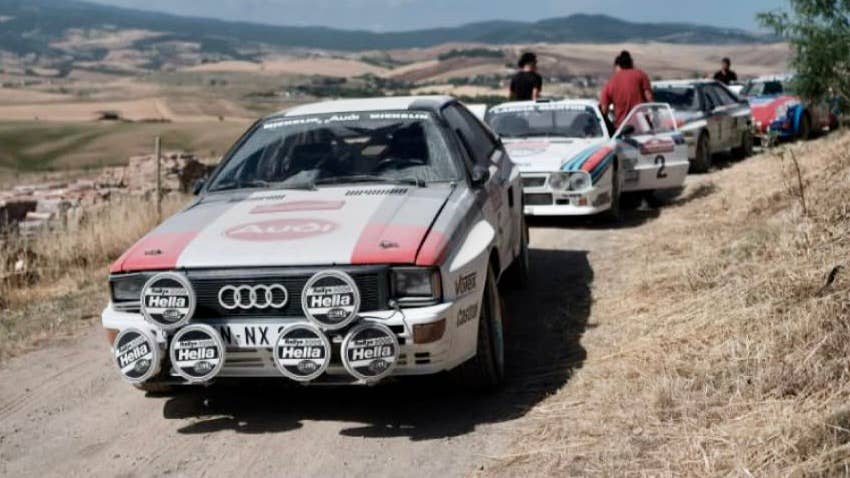Ferrari was less than satisfying for race fans. Luckily, there’s a better movie out there.

I went into the holidays looking forward to relaxing, spending time with family, and taking the edge off with a racing movie. You know the one. Spoiler alert: Michael Mann’s Ferrari isn’t a motorsport film. It’s mostly a film about Enzo Ferrari’s extramarital affairs, which, while scandalous, didn’t quite hit the mark for me. The most exciting part of it is when Enzo’s wife, masterfully played by Penelope Cruz, tries to shoot him in their office. That happens within the first five minutes, and Cruz’s standout performance can’t keep the rest of the disjointed film afloat.
Thankfully, there’s a better racing film out right now—one that follows a team’s arc over a historic season, in a uniquely grueling form of motorsport that doesn’t get a lot of love or coverage in the U.S. I’m talking, of course, about Race For Glory: Audi vs. Lancia. Directed by Stefano Mordini and starring Riccardo Scamarcio and Daniel Brühl as dueling team managers Cesare Fiorio and Roland Gumpert. The movie takes a close look at the 1983 World Rally Championship, the second season of the formidable Group B era.
Fiorio is the star of the show, and Race for Glory follows his arc as Lancia’s team manager as he contends with tight budgets, a fragile, technically inferior car in the rear-wheel drive Lancia 037, and a star driver in Walter Röhrl who is openly disinterested in victory. Despite these challenges, Fiorio is singularly focused on winning the championship, as Lancia’s management is considering pulling out of rallying after the ‘83 season. (Second spoiler alert: That didn’t happen.)
Rally is a bizarre, complex form of motorsport with all sorts of arcane rules. While far from perfect—some subplots never quite connect, there are a few confusing moments, and the pace can be … relaxed—Race For Glory captures the competition in a way that tickles the nerdiest among us without alienating more casual viewers. For example, it dedicates a scene to the Lancia 037’s homologation inspection, in which the company pretends it had built 200 roadgoing examples of the lightweight rally car when there were really just 103. Fiorio wines and dines the inspectors while car carriers whiz by in the background, and a standard, rule-book procedure becomes one of the film’s most memorable moments.
Confrontation between Roland Gumpert (Daniel Brühl) and Cesare Fiorio (Riccardo Scamarcio) after the Monte Carlo Rally. HanWay Films
Then there’s the scene, at the Monte Carlo Rally, where Fiorio secretly adds salt to icy rally stages to help the rear-drive 037’s chances. Gumpert is furious and dismayed to find out that his competitor’s actions didn’t technically violate the sport’s rules. This leads to my favorite dialogue of the movie, where Gumpert accuses Lancia’s boss of skirting regulations, and Fiorio retorts that Gumpert should know the rules because he wrote them. It’s a David-and-Goliath moment that asks the question: What is fair play? And: Is there a moral difference between exerting influence and getting your hands dirty?
The film’s decision to focus on the team managers as the central characters does come at a cost. I would’ve loved to see more drama between drivers Walter Röhrl and Michéle Mouton, who notably battled in the 1982 season in which Röhrl said he didn’t want to be the first man in motorsport to lose to a woman. Mouton isn’t much of a character, only getting a few lines of dialogue and appearing in action-packed racing scenes. That’s a shame, as her story of competing at the highest level in the sport as a woman could’ve been an important one to tell here. By painting Röhrl broadly as an eccentric beekeeper and downplaying this contentious rivalry, Race For Glory lost out on a key storyline.
Still, the combination of Group B cars, team drama, and a generally well-executed film means it’s worth a watch for anyone with even a passing interest in rally or 1980s motorsport. You can probably even convince your spouse or partner to watch it, too, as I did. So change out those slicks for studded snows this weekend and fire up Race For Glory: Audi vs. Lancia, available now to stream on YouTube, Prime Video, and Apple TV, or at your local independent movie theater.



